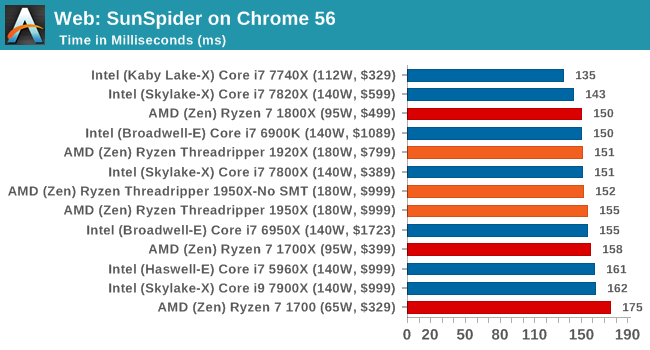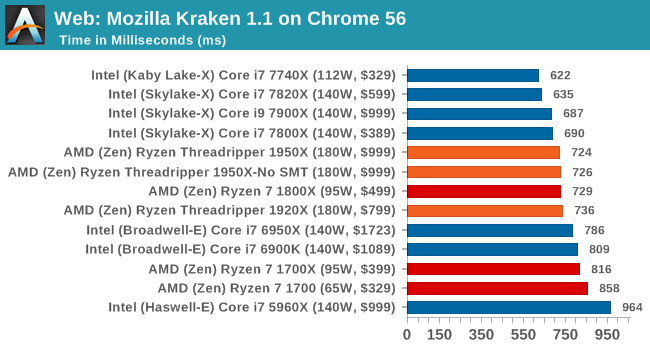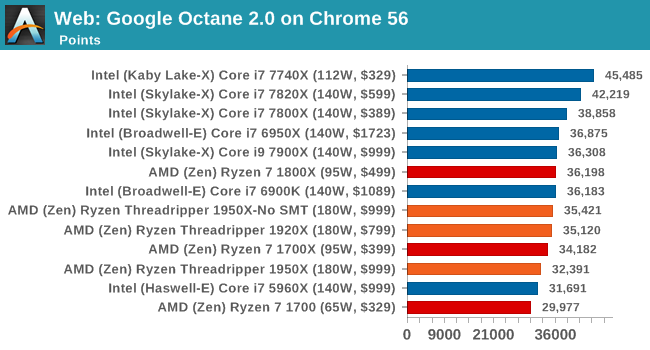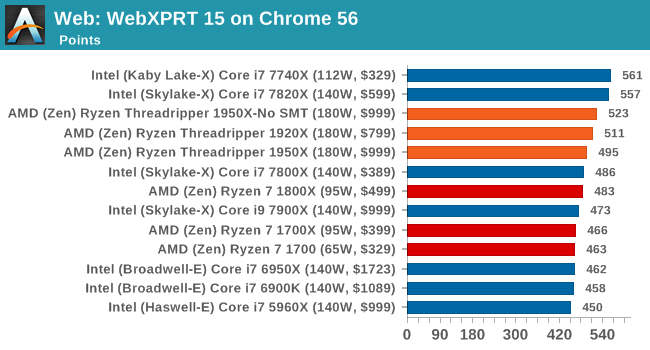The AMD Ryzen Threadripper 1950X and 1920X Review: CPUs on Steroids
by Ian Cutress on August 10, 2017 9:00 AM ESTCPU Web Tests
One of the issues when running web-based tests is the nature of modern browsers to automatically install updates. This means any sustained period of benchmarking will invariably fall foul of the 'it's updated beyond the state of comparison' rule, especially when browsers will update if you give them half a second to think about it. Despite this, we were able to find a series of commands to create an un-updatable version of Chrome 56 for our 2017 test suite. While this means we might not be on the bleeding edge of the latest browser, it makes the scores between CPUs comparable.
All of our benchmark results can also be found in our benchmark engine, Bench.
SunSpider 1.0.2: link
The oldest web-based benchmark in this portion of our test is SunSpider. This is a very basic javascript algorithm tool, and ends up being more a measure of IPC and latency than anything else, with most high-performance CPUs scoring around about the same. The basic test is looped 10 times and the average taken. We run the basic test 4 times.

Mozilla Kraken 1.1: link
Kraken is another Javascript based benchmark, using the same test harness as SunSpider, but focusing on more stringent real-world use cases and libraries, such as audio processing and image filters. Again, the basic test is looped ten times, and we run the basic test four times.

Google Octane 2.0: link
Along with Mozilla, as Google is a major browser developer, having peak JS performance is typically a critical asset when comparing against the other OS developers. In the same way that SunSpider is a very early JS benchmark, and Kraken is a bit newer, Octane aims to be more relevant to real workloads, especially in power constrained devices such as smartphones and tablets.

WebXPRT 2015: link
While the previous three benchmarks do calculations in the background and represent a score, WebXPRT is designed to be a better interpretation of visual workloads that a professional user might have, such as browser based applications, graphing, image editing, sort/analysis, scientific analysis and financial tools.

Overall, all of our web benchmarks show a similar trend. Very few web frameworks offer multi-threading – the browsers themselves are barely multi-threaded at times – so Threadripper's vast thread count is underutilized. What wins the day on the web are a handful of fast cores with high single-threaded performance.










347 Comments
View All Comments
Notmyusualid - Sunday, August 13, 2017 - link
Yep, I'll get the door for him.Jeff007245 - Friday, August 11, 2017 - link
I don't comment much (if ever), but I have to say one thing... I miss Anand's reviews. What happened to AnandTech?What ever happened to IPC testing when IPC used to be compared on a clock for clock basis? I remember the days when IPC used to be Instructions Per Clock, and this website and others would even use a downclock/overclock processors at a nominal clock rate to compare the performance of each processor's IPC. Hell, even Bulldozer with a high clock architecture was downclocked to compare is "relative IPC" in regards using a nominal clockrate.
And to add to what other's are saying about the bias in the review... Honestly, I have been feeling the same way for some time now. Must be because AnandTech is at the "MERCY" of their mother company Purch Media... When you are at the mercy of your advertisers, you have no choice but to bend the knee, or even worse, bend over and do as they say "or else"...
Thanks for taking the time in creating this review, but AnandTech to me is no longer AnandTech... What other's say is true, this place is only good for the Forums and the very technical community that is still sticking around.
fanofanand - Tuesday, August 15, 2017 - link
Downclocking and overclocking processors to replicate a different processor within the same family can lead to inaccurate results, as IPC can and does rely (at least to a degree) on cache size and structure. I get what you are saying, but I think Ian's work is pretty damn good.SloppyFloppy - Friday, August 11, 2017 - link
Why did you leave out the i9s from the gaming tests?Why didn't you include the 7700k when you include 1800x for gaming tests?
People want to know that if they buy a $1k 7900X or 1950X if it's not only great for media creation/compiling but also gaming.
silverblue - Friday, August 11, 2017 - link
Stated why at the bottom of page 1. Also, he used the 7740X, so there is little to no point in putting the 7700K.Lolimaster - Friday, August 11, 2017 - link
The 1950X is as good at gaming as the 1800X, OCed 1700, with many more cpu resource to toy with.Swp1996 - Friday, August 11, 2017 - link
Thats The Best Title I have ever seen ...😂😂😂😂🤣🤣🤣🤣🤣 Steroids 😂😂😂🤣🤣🤣🤣🤣🤣🤣corinthos - Friday, August 11, 2017 - link
in other words.. AMD Ryzen is still the best bet for most people, and the best value. 1700 OC'd all day!BillBear - Friday, August 11, 2017 - link
>Move on 10-15 years and we are now at the heart of the Core Wars: how many CPU cores with high IPC can you fit into a consumer processor? Up to today, the answer was 10, but now AMD is pushing the barrier to 16I don't personally think of Threadripper or parts like Broadwell-E as being consumer level parts.
For me, the parts most consumers use have been using for the last decade have been Intel parts with two cores or four cores at the high end.
It's been a long period of stagnation, with cutting power use on mobile parts being the area that saw the most attention and improvement.
James S - Friday, August 11, 2017 - link
Agree the HEDT platforms are not for the average consumer they are for enthusiasts, professional workstation usage, and some other niche uses.When the frequency war stopped and the IPC war started. We should have had the core competition 5-8 years back since IPC stagnated to a couple percent gains year on year.